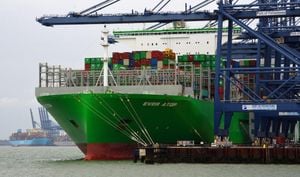A new report from the U.S. Government Accountability Office (GAO) uncovers the alarming reality of firearm trafficking from the United States to the Caribbean. Not only does this study reveal where the firearms are coming from, but it also sheds light on how they influence crime rates and violence within the region. The findings confirm what leaders and residents of Caribbean nations have long been saying: the majority of the guns contributing to skyrocketing homicide rates are sourced from the U.S., particularly from states like Florida, Georgia, and Texas.
According to the GAO’s investigation, which traced the origins of approximately 5,400 firearms recovered between 2018 and 2022, about 73% of these weapons traced back to the U.S. were linked to crime scenes occurring across various Caribbean nations, including Jamaica, Haiti, and Trinidad and Tobago. Such specific data highlights how interconnected the problem of gun violence is with transnational crime networks, complicity from local governments, and the ineffectiveness of regulatory frameworks.
Previous studies corroborate these findings. A report by CNN also indicated nearly three-quarters of the firearms used by gangs and criminals were American-made. This influx of firearms is exacerbated particularly in Haiti, where gang warfare is increasingly becoming the norm. Despite the country being unable to manufacture firearms locally, gangs have no trouble acquiring weaponry — and the bulk, it turns out, is sourced from across the U.S. border.
GAO officials highlighted specific aspects contributing to the issue. While the statistics reveal the scale of firearms originating from the U.S., it also points out shortcomings within Caribbean nations' responses to gun trafficking. Some governments have demonstrated varying degrees of willingness to trace and recover firearms effectively. Despite grievances about the problem, some nations do not facilitate operations aimed at identifying illegal trafficking routes. Without compulsory cooperation or infrastructure to effectively trace weapons back to their origins, criminal organizations operate largely unchecked.
Efforts to address this issue have been discussed at political levels, particularly among U.S. lawmakers seeking to assist Caribbean leaders. Democratic U.S. Representative Joaquin Castro from Texas said it best: “The most effective way to address violence and instability in the Caribbean is to prevent U.S. guns from falling to the hands of criminals.” Castro was among the three prominent legislators who sought the GAO report following persistent requests from Caribbean nations for assistance on combatting gun trafficking.
Fellow legislators, including New York Rep. Gregory Meeks and Illinois Senator Dick Durbin, have echoed similar sentiments, emphasizing the pressing need to bolster regional efforts against the threats posed by gun trafficking. The suggestion is clear: investing resources and political will to curb the flow of arms from the U.S. is pivotal to enhancing security for both the Caribbean and America.
So, where are these guns coming from? The report indicated sales from states like Florida, Georgia, and Texas are particularly prominent, which raises questions about the regulatory measures governing gun sales and shipments. Particularly, firearms sold online or through private sellers tend to bypass much of the existing scrutiny faced by traditional gun shops.
Criminal enterprises leverage loopholes within legal frameworks to smuggle weapons. For example, some traffickers misrepresent the value of shipments to evade regulatory oversight, thereby disguising firearms sent through typical legal channels. This alarming tactic came to light with the recognition of the revival of underground operations — merchants attempting to cheat the system via false declarations when importing goods.
Jamaica, which led the Caribbean with the highest seizures of firearms, shows deeply rooted issues challenging its law enforcement efforts. Most disconcerting is the lack of centralized record-keeping concerning seized weapons. Despite having nine government-controlled ports through which legitimate imports flow, the island has 151 uncontrolled ports, which criminal enterprises exploit frequently.
Jamaican officials revealed their records of firearms are predominantly paper-based, presenting significant challenges for analysis, data retrieval, and informed decision-making. They cited the perils of physical records, which are susceptible to loss or damage and hinder their overall response to gun trafficking. Meanwhile, U.S. authorities have been ramping up efforts to assist through various partnerships, yet there is still much work to be done. Initiatives such as gun-sniffing canines were previously employed but proved costly and difficult to sustain due to underlying security concerns and logistical inefficiencies.
Despite efforts mounted through U.S. engagement, Caribbean authorities are fighting against tides of corruption and insufficient technology for accurate firearms tracing. Language barriers, political instabilities, and isolated incidents of violence have compounded the challenges for achieving effective cooperation.
Given the gravity of this situation, some lawmakers are advocating for stronger legislative frameworks aimed at undermining the trafficking networks supplying international drug cartels and aiding criminal organizations within the region. Senator Durbin emphasized the need to enact relatable laws to stem the sometimes termed “iron river” of firearms trafficked to Latin America and the Caribbean.
While various initiatives have been discussed, recent proposals like the ARMAS Act, introduced by Rep. Castro, aim for comprehensive interagency strategies to address and mitigate the flow of illegal firearms through more cohesive policies. Another legislative push, the CATCH Act, also co-sponsored by Rep. Cherfilus-McCormick of Florida, targets illicit firearms as part of broader efforts to restore security to regional communities.
Combatting the trafficking of firearms isn’t just pivotal for Caribbean nations; it’s tied directly to national security for the U.S. as well. By taking decisive action today, lawmakers hope to secure communities across both the Caribbean and the continental U.S. from the rising tides of violence emanated from uncontrolled gun access.
The findings from these recent reports leave many questions unanswered: How can the U.S. reduce the influx of arms destined for the Caribbean? And what role should local governments play to address the crisis, ensuring effective traceability and regulation against the backdrop of increasing violence? There’s no doubt, this pressing issue demands urgent and united action — because, after all, lives depend on it.



